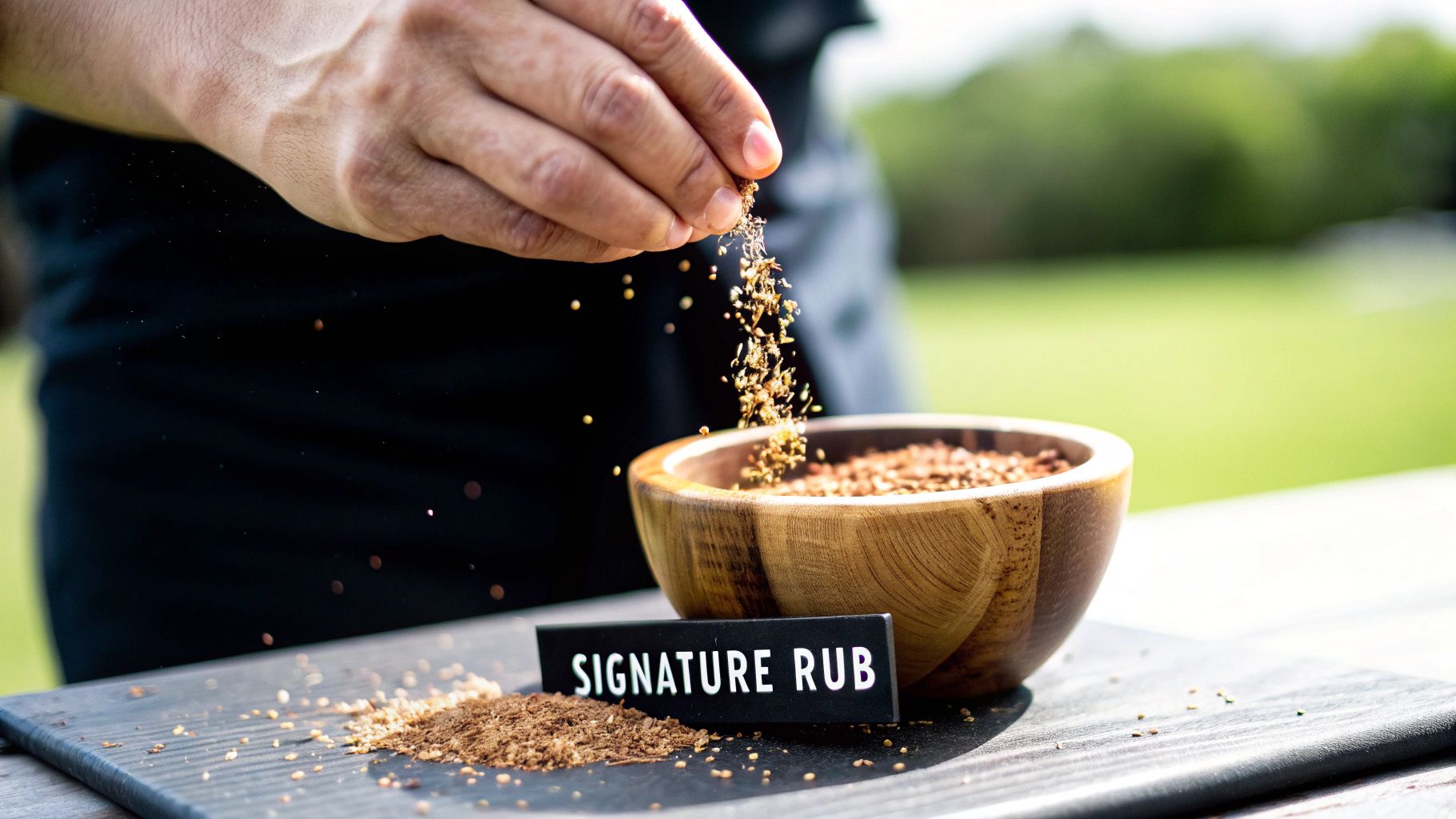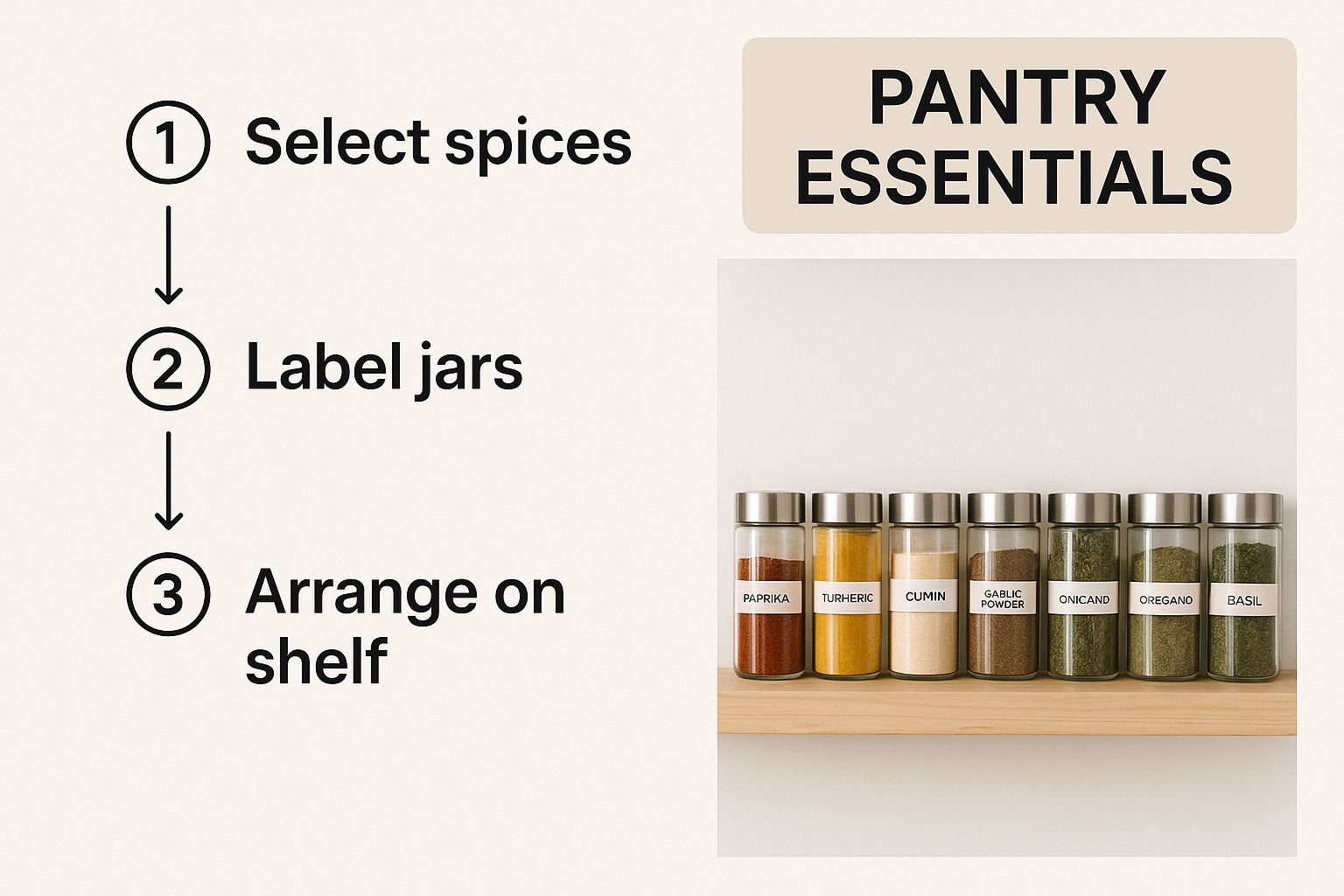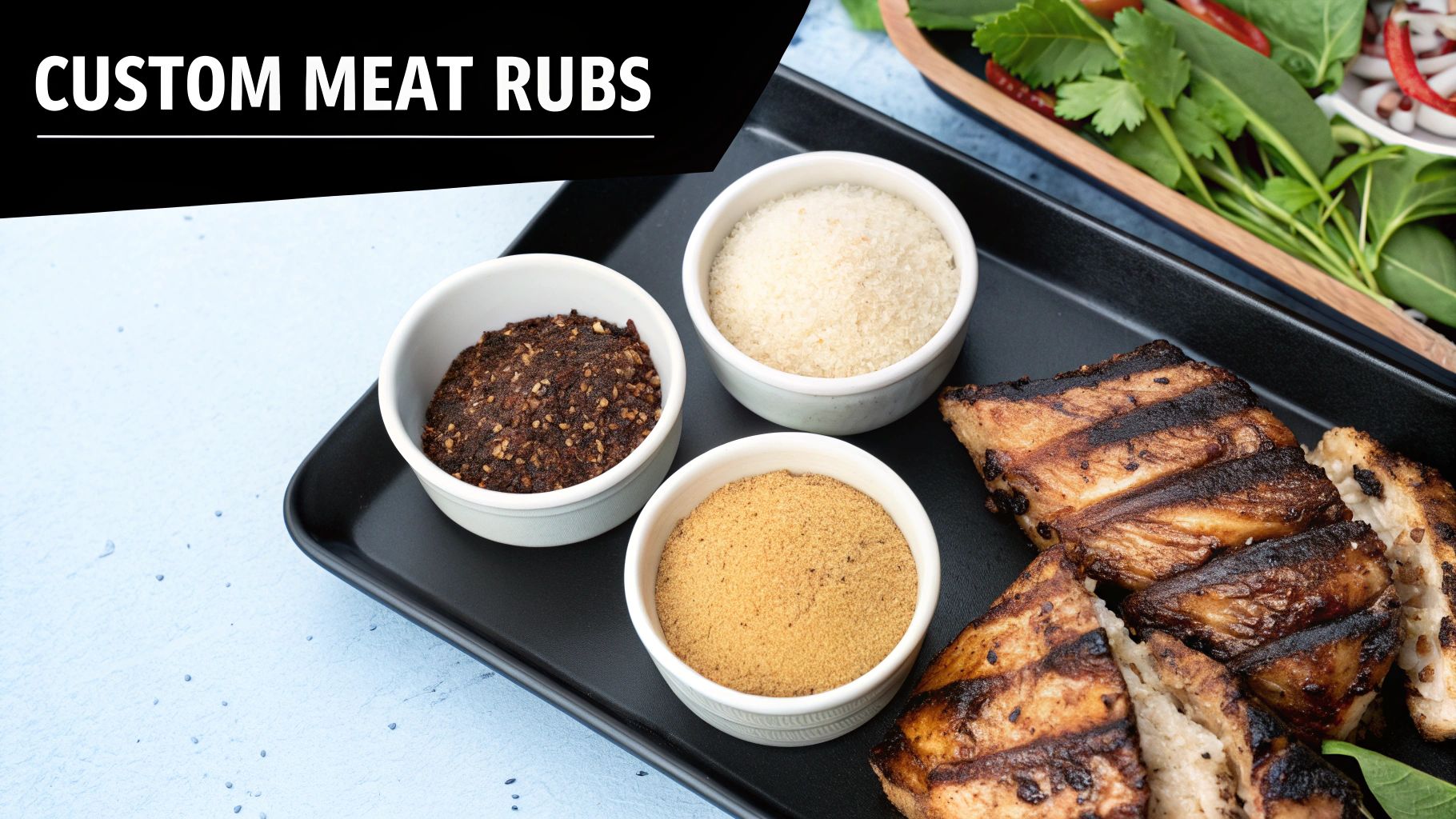How to Make BBQ Seasoning at Home
Every great BBQ rub comes down to a perfect harmony of four things: sweet, savoury, spicy, and smoky. Get that balance right, and you’ve got magic.
It's all about playing with authentic ingredients like brown sugar for sweetness, smoked paprika for colour and depth, garlic powder for that savoury hit, and a pinch of cayenne for a kick. This isn't complicated chemistry; it's about crafting a signature flavour profile with no added crap, just pure taste for whatever you're cooking.
Why A Homemade BBQ Rub Is A Game Changer
Let’s be honest, those generic shakers from the supermarket are often packed with preservatives and flavour enhancers. They’re fine in a pinch, but learning how to make your own BBQ seasoning is what separates the good from the great.
When you mix your own blend, you're not just throwing spices together. You're creating a signature flavour profile. This is where you move past the one-size-fits-all stuff and start crafting rubs specifically designed for the meat you're cooking, whether it's seasonings for BBQ ribs or the perfect rub for chicken.

The Benefits Of A DIY Blend
The difference between a homemade rub and a store-bought one is night and day. When you source and mix the ingredients yourself, you’re guaranteeing a freshness and punch that mass-produced seasonings just can't touch.
Here’s why it’s worth the tiny bit of extra effort:
- No Added Crap: You know exactly what’s in there. That means no weird anti-caking agents, no fillers, and no excessive salt. Just pure, unadulterated flavour.
- Total Flavour Control: Love an authentic smoky kick? Add more chipotle powder. Cooking for the family? Just dial back the cayenne. You’re the one in charge.
- Freshness Is King: Spices lose their potency over time. Grinding whole spices just before you mix them delivers an intensity that elevates everything. A decent set of electric food grinders and processors makes this a breeze.
The real magic of a homemade rub is its ability to build a perfect 'bark'—that irresistible, caramelised crust on slow-cooked meats. The sugar, salt, and spice all work together to create a texture and flavour you just can't get from a jar.
At the end of the day, making your own seasoning is one of the easiest wins for levelling up your BBQ. It delivers massive results, whether you’re grilling chicken for a quick weeknight dinner or smoking a brisket all weekend.
Stocking Your Pantry with Essential Spices
Every truly great BBQ seasoning begins long before you even think about lighting the grill. It starts in your pantry. When you stock up on high-quality, essential spices, you're not just buying ingredients; you're building a flavour arsenal. This gives you the power to craft the perfect blend for any occasion, free from the fillers and "no added crap" you often find in shop-bought options.
This isn't about just grabbing any old jar off the shelf. It’s about understanding what each component brings to the party. A well-stocked spice rack is the bedrock of any homemade blend.
This visual guide breaks down the key players you'll want to get your hands on.

Having these core ingredients on standby means you're always just a few minutes away from whipping up a fresh, potent seasoning that blows the supermarket stuff out of the water.
The Savoury and Smoky Foundation
Every legendary BBQ rub needs a solid base. This is where your core savoury and smoky elements step in, providing that deep, rich background for all the other flavours to dance on.
- Paprika: This is the heart and soul of most BBQ seasonings. Sweet paprika gives you a mild, fruity flavour and that classic vibrant red colour. Smoked paprika (pimentón) is where the magic happens, delivering an intense, woody aroma that fools you into thinking everything was cooked over a real fire. Hot paprika, of course, brings the heat along with the colour.
- Garlic & Onion Powder: Think of these two as the unsung heroes of the savoury world. They lay down a foundational, aromatic depth that just works with pretty much any meat or vegetable you can throw at them. Always go for powder over granules for a much finer, more consistent blend.
For a simple but incredibly effective starting point, many pitmasters swear by a basic mix of salt, pepper, and garlic. You can read our guide on what SPG seasoning is to see how these three simple ingredients create a truly versatile base for any cookout.
Building Flavour with Heat and Sweetness
Once your savoury base is locked in, it's time to add the layers that make a BBQ seasoning truly unforgettable. It’s that push-and-pull between sweet and spicy that creates an addictive, perfectly balanced taste.
Brown sugar is a non-negotiable for creating that perfect 'bark' on slow-cooked meats like ribs and pulled pork. As it cooks, it caramelises, adding a deep, molasses-like sweetness and a beautifully crisp texture. Coarse sea salt or kosher salt is just as crucial; its larger crystals dissolve slowly, pulling moisture from the meat's surface to create a natural brine that amps up both flavour and tenderness.
Don't underestimate the power of freshly ground black pepper. Its sharp, pungent bite cuts right through the richness of the meat and balances the sweetness of the sugar, creating a much more complex and satisfying flavour profile.
The desire to craft these complex profiles at home is growing fast. The UK BBQ seasoning market is a slice of a massive global spices sector valued at USD 24.51 billion in 2024, and it's set to grow as more of us get adventurous with bold flavours. This trend shows a real shift towards creating customised, high-quality blends right in our own kitchens.
Mastering the Perfect Flavour Ratios
The real secret to an unforgettable BBQ seasoning isn't just about what you throw in the bowl; it’s all about the balance. Nailing the interplay between sweet, savoury, and spicy is how you go from just following a recipe to creating a signature flavour that's yours and yours alone. When you get the proportions right, no single ingredient screams for attention—they all just work together perfectly.
Think of it like building a house. You need a solid foundation before you start picking out cushions. A brilliant starting point for any all-purpose rub is a simple, proven formula you can build on. This structure gives you the perfect canvas to get creative.
The Foundational Rub Formula
A great, versatile base recipe follows a simple "part" system. A "part" can be a tablespoon, a cup, or even a small bucket—as long as you keep the ratio consistent, you're golden.
Here's a classic structure that delivers the goods every single time:
- 4 parts Smoked Paprika (This is your smoky, colourful base)
- 2 parts Soft Brown Sugar (Brings the sweetness and helps with that beautiful caramelisation)
- 2 parts Coarse Salt (The flavour enhancer that also builds an amazing crust)
- 1 part Garlic Powder (For that non-negotiable savoury depth)
- 1 part Coarsely Ground Black Pepper (Adds that pungent, background kick)
This ratio just works. The paprika lays down a robust, smoky foundation without being overpowering. The equal measures of sugar and salt create that classic sweet-and-savoury dynamic that is the soul of great barbecue. From there, the smaller amounts of garlic and pepper layer in those aromatic, punchy top notes.
It’s no wonder so many people are mixing their own rubs these days. In fact, surveys show that around 65% of UK households that cook outdoors make their own BBQ seasoning mixes. And of those, an estimated 70% prefer dry rubs for their incredible shelf life and ease of use. If you want to get deeper into the technique, our guide on what makes dry rubs for meat so effective is a great place to start.
How to Customise Your Blend
Once you've got the base formula down, the real fun begins. Tweaking the ratios lets you tailor the seasoning for whatever you're cooking, whether it's chicken thighs, a whole rack of pork ribs, or even a tray of roasted veg.
The key is to make small changes and taste as you go. Mix up a small test batch and sprinkle a tiny bit on a piece of cooked chicken or even a fried egg. You'll get an instant feel for the flavour profile before you commit to a big batch.
Here are a few practical examples of how to adapt the base recipe:
- For Sweeter Pork Ribs: Bump the brown sugar from 2 parts up to 3 parts. That extra sugar will help create a beautiful, sticky glaze on the ribs as they cook low and slow. This is the secret to great seasonings for BBQ ribs.
- For a Savoury Chicken Rub: Drop the brown sugar to 1 part and bring in 1 part onion powder and ½ part dried thyme. This gives you a more herbaceous, savoury blend that's perfect for grilled or air-fried chicken.
- For a Spicy Kick: Add ½ to 1 part cayenne pepper or chipotle powder. Chipotle is a great choice because it adds not just heat but another layer of smokiness, which is fantastic on beef.
Learning to make your own BBQ seasoning is all about understanding these relationships. Start with a balanced foundation, then confidently tweak the ratios. Before you know it, you'll have created a truly unique flavour that will have everyone asking for your secret recipe.
Custom Rubs for Chicken, Ribs and Pulled Pork

The all-purpose rub we've built is a killer starting point, but the real art of BBQ comes alive when you start tailoring your seasonings. Let's be honest, what works for a massive pork shoulder won't be quite right for a delicate chicken thigh.
This is where you move from following a recipe to creating one. With a few simple tweaks to our base formula, you can craft bespoke BBQ seasonings for chicken, ribs, and pulled pork that make each one sing. It’s all about knowing what different meats need to be their best selves.
A Vibrant Rub for BBQ Chicken
Chicken has a much milder flavour profile, which means it plays incredibly well with brighter, more herbaceous seasonings. The aim is to compliment the meat without steamrolling it, creating that perfect, flavour-packed crispy skin whether it's on the grill, in the oven, or in the air fryer.
To get there, we'll shift our base recipe towards something a little more aromatic and zesty.
- Dial back the smoke, bring in the sweet: Swap half of the smoked paprika for sweet paprika. This keeps the colour but lessens the smoky intensity.
- Add an earthy, savoury note: Mix in 1 part of dried thyme or oregano. This classic herb flavour is a natural fit for poultry.
- Give it a tangy kick: A 1 part measure of mustard powder adds a brilliant sharpness that cuts through the richness of chicken skin.
How to season chicken thighs for the air fryer in 2 minutes: Pat your chicken thighs bone dry with a paper towel. A tiny drizzle of olive oil, then a generous coating of your new chicken rub. Really work it in, especially under the skin. Pop them in the air fryer at 200°C for 20-25 minutes, flipping once. You'll get ridiculously juicy meat and glass-like crispy skin.
A Sweet and Smoky Rub for Ribs
For truly epic BBQ ribs, you need a rub that builds that beautiful, glossy, caramelised bark. That means we need to lean into the sweet and smoky side of things. The sugar is key here—it melts and caramelises during that long, slow cook, creating the sticky, irresistible glaze that defines great ribs.
To nail your seasoning for BBQ ribs, we'll bump up the sugar and deepen the savoury notes.
- Double down on the sweet: Increase the soft brown sugar from 2 parts to 3 parts. This is non-negotiable for achieving that perfect bark.
- Build savoury depth: Add 1 part of onion powder. It partners with the garlic to create a more rounded, savoury foundation.
- Introduce a hint of warmth: Just a ½ part of cumin adds a subtle, earthy warmth that pork loves.
Get this rub on your ribs, wrap them up tight, and let them hang out in the fridge for a few hours (overnight is even better). This gives the salt time to do its thing, creating a flavour-packed paste that won't budge when the heat hits.
A Robust Rub for Pulled Pork
Pulled pork is a marathon, not a sprint. It cooks low and slow for hours, so it demands a seasoning that's bold enough to go the distance without getting lost. We need deep, complex flavours that can penetrate a huge cut of meat and stand up to all that rendered fat and smoke.
For the ultimate seasoning for BBQ pulled pork, we're bringing in the heavy hitters.
- Boost the smoky heat: Add 1 part of chipotle powder. It delivers a smoky warmth that's far more interesting than straight cayenne.
- Deepen the earthy notes: Increase the cumin to a full 1 part. Its distinctive flavour is a classic partner for pork shoulder.
If you really want to go deep on crafting the perfect blend for this low-and-slow classic, check out our complete guide to making an authentic pulled pork rub recipe.
See? Those simple adjustments completely transform one base recipe into three specialised blends. It just goes to show that once you know the rules, you can create the perfect flavour for absolutely anything you want to cook.
Keeping Your Homemade Rub Fresh
Right, you’ve just nailed the perfect BBQ seasoning – a proper blend of authentic flavours with none of the usual rubbish. The last thing you want is for all that effort to go to waste because of poor storage. Getting this part right is the key to keeping that fresh, punchy flavour you worked so hard on.
Think of it like this: your rub has four main enemies: light, heat, air, and moisture. They’re the culprits that wreck the essential oils in your spices, turning a vibrant, aromatic blend into a dull, lifeless powder. This is exactly why chucking it in a simple plastic bag just isn't going to cut it.
The Best Way to Store Your Rub
To give your homemade seasoning the longest life possible, it needs a proper home. The best options are the ones that put up a solid defence against those four flavour-killers.
- Airtight Glass Jars: A small glass jar with a really tight lid is a great choice. Glass doesn't hold onto old smells, so your rub stays pure. If you can get your hands on a dark-coloured or amber glass jar, even better – that’ll block out the damaging light.
- Decent Tins or Cans: Metal tins are another top-tier option. We use our Smokey Rebel craft cans for a reason. They're completely light-proof and give you a proper airtight seal to lock out oxygen and moisture, keeping everything inside as fresh as the day you mixed it.
Whatever you end up using, stick a label on it. Jot down the name of the blend and, more importantly, the date you made it. It’s a tiny step that makes a huge difference in making sure you’re always using your rub at its absolute peak.
Find a cool, dark spot for your creation. A kitchen cupboard or pantry works perfectly, as long as it's away from the oven, the hob, or a sunny windowsill. Steer clear of the fridge, though. The condensation in there can make your rub clump together into a solid brick.
Stored properly, your homemade BBQ seasoning should stay spot-on for about 6-12 months. It’ll still be safe to use after that, but you’ll probably notice the aroma and flavour have started to fade. The best test? Just give it a sniff. If the scent is weak, it’s time to get mixing again.
FAQs: How to Make BBQ Seasoning
What’s the difference between a BBQ rub and a marinade?
A BBQ rub is a dry mix of spices, herbs, and sugar massaged onto the meat's surface to create a flavourful crust, or 'bark'. A marinade is a liquid (often acidic) that tenderises and flavours the meat from the inside out. For a classic BBQ crust, a dry rub is essential.
Can I make a BBQ seasoning without sugar?
Absolutely. A sugar-free rub creates a more savoury or spicy profile, perfect for beef, lamb, or BBQ rubs for vegetables. It's also ideal for high-heat grilling as there's no sugar to burn. Boost savoury notes with more garlic powder, onion powder, or celery seed to compensate.
How much BBQ seasoning should I use?
A good starting point is one tablespoon of rub per pound of meat (around two tablespoons per kilo). The goal is a generous, even coating. Don't be shy, especially on large cuts like pork shoulder. For smaller items like wings or prawns, a lighter dusting is fine.
When should I apply a dry rub?
For best results, apply it in advance. For smaller cuts like steaks or chicken thighs, 30-60 minutes before cooking is great. For large cuts like brisket or ribs, applying the rub 12-24 hours ahead (the night before) allows the salt to dry brine the meat, making it more juicy and flavourful.
Ready to skip the mixing and get straight to the flavour? The team at Smokey Rebel has perfected a range of small-batch rubs packed with authentic cultural flavours and no added crap. Explore our collection in our signature craft cans and find your new favourite.
Discover the full range of Smokey Rebel BBQ rubs and seasonings at smokeyrebel.com
Join our Mailing List
Sign up and get Smokey Rebel Recipes + weekly recipes straight to your inbox!
Recent articles
How to Make BBQ Seasoning at Home
Learn how to make BBQ seasoning with our expert guide. Discover the perfect ingredient ratios and recipes to elevate your...
Read morePerfect Gift Set Spices for Every BBQ and Kitchen Occasion
Find the ideal gift set spices with tips on flavor profiles, pairings, and cooking ideas. Perfect for BBQ lovers and...
Read moreMastering the Perfect Barbecue Chicken Rub
Discover the secrets to incredible flavour with the right barbecue chicken rub. Learn how to choose, apply, and cook for...
Read more


